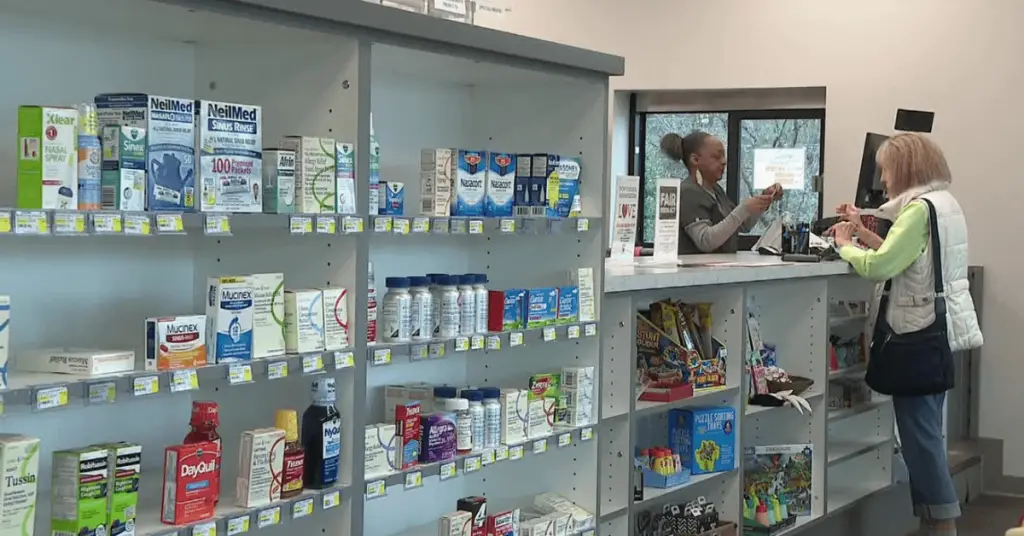MONTGOMERY, Ala. (WIAT) — Every time you fill a prescription, you might not be aware of the struggles your local pharmacy faces behind the scenes. Pharmacy benefit managers, or PBMs, play a critical role in how much pharmacies are reimbursed for filling prescriptions, and their influence has become a growing concern for small, independent drugstores. These middlemen control the financial arrangements between pharmacies and insurance companies, and for many smaller pharmacies, this has created a financial burden that is difficult to bear.
Lawmakers in Alabama are taking action to support these local drugstores, which are vital to many communities, especially in rural areas. On Tuesday, the Alabama House passed a bill aimed at helping these small pharmacies survive in an environment dominated by large pharmacy chains and PBMs. The new legislation requires that PBMs reimburse pharmacies at least $10.64 for every prescription they fill, which is the same reimbursement rate Medicaid currently provides.
Pharmacies Struggling to Stay Open
Josh Hardin, a pharmacist and owner of Mills Pharmacy in Hoover, is one of many small business owners who have felt the financial strain caused by PBMs. Last year, Hardin made the difficult decision to shut down one of his drugstores. For him, this was not just a business decision—it was a heartbreaking choice to close a location that had served his community for years.
“We’ve got relationships with those patients, and we’re having to explain to them why their pharmacy is disappearing,” Hardin said. “It was a hard decision, but it was one that we ultimately had to make.”

Hardin explained that PBMs are not just administrators of pharmacy benefits—they also operate their own pharmacy chains. This creates unfair competition for small, independent pharmacies like his, which are struggling to compete with these massive organizations that have the power to set reimbursement rates. The difficulty of competing against companies that manage pharmacy benefits while running their own pharmacy operations has made it increasingly hard for small pharmacies to survive.
“We’re essentially competing with the companies that administer the pharmacy benefit for your insurance,” Hardin said. “They have their own pharmacy operations.”
New Bill Aims to Help Local Pharmacies
The bill passed by the Alabama House aims to provide relief to small pharmacies by requiring PBMs to reimburse them at a fair rate. This bill, sponsored by State Representative Phillip Rigsby (R-Huntsville), mandates that PBMs reimburse pharmacies at least $10.64 per prescription, the same amount that Medicaid pays for prescriptions. The goal is to ensure that independent pharmacies are fairly compensated for the services they provide to their communities.
“I think everybody understands we’ve got to make sure that those patients continue to have access to their local pharmacies and make sure the PBMs are paying a fair reimbursement,” Rigsby said in a statement following the passage of the bill in the House.
The bill has been supported by many pharmacy owners, especially those struggling to stay afloat. By setting a clear reimbursement rate, the legislation ensures that pharmacies will receive adequate compensation for their services, making it easier for them to continue operating. In the long term, this bill could protect jobs, prevent pharmacy closures, and ensure patients continue to have access to local pharmacies.
Concerns About the Impact on Patients
While the bill has garnered support from local pharmacy owners and lawmakers, some groups have raised concerns about how this legislation could affect patients. The Alliance of Alabama Healthcare Consumers, for example, has warned that the new fee structure might lead to higher prescription costs for patients. These groups worry that PBMs might pass on the price of increased reimbursement rates to consumers, potentially leading to higher copays or out-of-pocket expenses.
However, Representative Rigsby has made it clear that the bill contains provisions designed to prevent this from happening. He emphasized that the bill’s intention is to protect both pharmacies and patients by providing transparency and ensuring that pharmacies are reimbursed fairly without shifting additional costs to consumers.
“This is a step forward, I believe, in helping employers, patients, and pharmacies start to see transparency in this system,” Rigsby said.
Support from Rural Areas
The bill also has strong backing from legislators representing rural areas, where many small drugstores are struggling the most. State Representative A.J. McCampbell (D-Livingston) has been vocal in his support for the bill, stressing that it is essential to help local pharmacies, especially in rural parts of the state. In these areas, small, independent drugstores often serve as the only option for residents to fill prescriptions.
“The small mom and pop — your neighbor, my neighbor — can stay in business and provide a tax base also for our communities,” McCampbell said. “We need to make sure that these pharmacies are around to serve the people in these rural areas.”
For rural communities, losing a local pharmacy can mean more than just a loss of convenience—it can also impact the community’s economy. Many rural drugstores employ local workers, and their closure can result in job losses and the loss of an important regional business.
Next Steps for the Bill
After passing the House, the bill now heads to the Alabama Senate for final approval. If the Senate approves the bill, it will become law, bringing relief to local pharmacies and ensuring that they can continue to serve their communities. If passed, the bill could set a precedent for other states facing similar challenges with PBMs and local pharmacies.
The legislative effort in Alabama is part of a larger movement across the country to address the issues caused by PBMs and their control over pharmacy reimbursements. Similar bills are being considered in other states, and Alabama’s action may inspire other lawmakers to follow suit and take steps to protect small pharmacies from the financial pressures that have made it difficult for them to survive.
A Step Toward Fairness and Transparency
Ultimately, the new bill represents an important step toward fairness and transparency in the pharmacy benefit management system. By ensuring that local pharmacies are reimbursed fairly for their work, the bill seeks to provide the support that small drugstores need to stay open and continue serving their communities. This legislation could have a far-reaching impact on the future of local pharmacies in Alabama and may inspire similar reforms across the nation.
Disclaimer: This article has been meticulously fact-checked by our team to ensure accuracy and uphold transparency. We strive to deliver trustworthy and dependable content to our readers.



